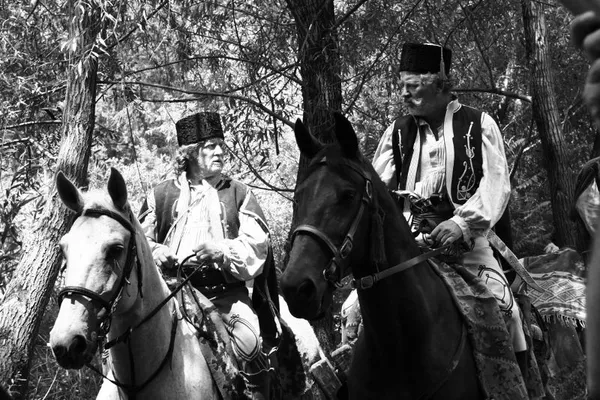 |
| Radu Jude: 'Almost 90 per cent of what the characters are saying in the film is taken directly from historical documents or obscure written sources from the 19th century' Photo: Silviu Ghetie |
Could you tell me a bit about the generational aspect of the film. There is a father and son dynamic but also you're using history to talk about more modern society and how it reflects things getting passed down the generations, including prejudices.
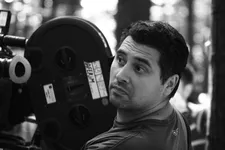 |
| Radu Jude: 'I think this is the main topic of the film - how the present exists because of the way things were in the past' Photo: Silviu Ghetie |
That sense of being forced to conform, even when the young boy doesn't agree and takes a softer view, there's a sense of society constantly trying to constrain him and force him to conform to the ideas of the previous generation.
It is a trick with the idea that we human beings have. Many times we have the idea that our ideas belong to ourselves or even our deep selves. But, in fact, many of the ideas we have about life are not our ideas, coming from direct experiences but ideas we are taking for granted from other people.
You did a lot of research so you could use the language of the time. How important was it for you to do that rather than use more modern phrases?
There's a philosophy of language, starting with Wittgenstein, that suggests your view of the world is made by language and the way we use words creates the mentality and, in the end, the social reality. So this is why the reconstruction of the language was even more important than the reconstruction of the props or the costumes, because the language is the way we think - we think with language, we cannot think without it.
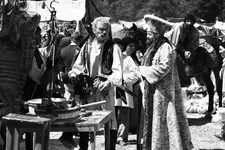 |
| Radu Jude: 'This machismo and sexism that existed for so many centuries still has an influence today. Romania is a sexist society' Photo: Silviu Ghetie |
Yes, it is true. I wanted to the viewer to experience two directions at the same time. One direction is the reconstruction that was very carefully done as regards language, costumes, social behaviour and so on. On the other hand, I wanted the viewer to be constantly aware of the fact that he or she is only seeing a film directed by a human being who has his own vision. And that maybe some other people could have another take on that.
How important do you think the issues are today - particularly regarding the Roma? There have been quite a lot of documentaries recently showing that the Roma are still facing incredible prejudice in various places in Europe. How important is it for you to have that issue - albeit in an historical context - within in the film?
I think this is the main topic of the film - how the present exists because of the way things were in the past. We tend to think of the present as something which is cut-off from the past and this is not true. The film didn't stop. You could say, 'From 1851, slavery doesn't exist in Romania' but, in reality, all those 500 years of slavery created a mentality and a mindset and problems that, in one way or another, exist in our days as well. Of course, some of problems the Roma people face and some of the problems of the lack of integration of the Roma population in Romanian society have to do with the distant past. I believe this and I wanted to show it.
Presumably, you don't think there is an easy solution to that situation?
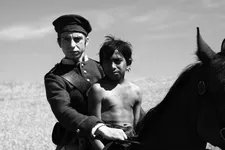 |
| Radu Jude: 'I wanted to the viewer to experience two directions at the same time' Photo: Silviu Ghetie |
That idea of 'labels' is very interesting in the film and used in a very funny way in a moment when a priest stands up and decries everybody, one after another every nation gets short-shrift, until he gets to the Jews, whom he brands the worst of all. Did you have some fun writing that scene, drawing perhaps on some of the worst kind of labelling you have come across?
I didn't write it myself. Almost 90 per cent of what the characters are saying in the film is taken directly from historical documents or obscure written sources from the 19th century. The moment you mention, that's really taken from a book.
I'm also interested that you show women's position is, perhaps not equally bad, but almost at the same sort of level and there's something to be said about the sexism that's also getting passed down the generations.
Yes, it's true. It's something I discovered while researching the film and its also another topic that people are not dealing with. They say, 'Well, these problems existed in other countries as well.' And I say, of course, I never denied that these problems existed in other societies, I'm just saying that we have this problem as well and this machismo and sexism that existed for so many centuries still has an influence today. Romania is a sexist society.
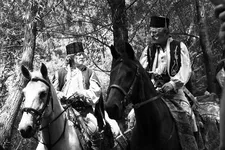 |
| Radu Jude: 'Almost 90 per cent of what the characters are saying in the film is taken directly from historical documents or obscure written sources from the 19th century' Photo: Silviu Ghetie |
The film has mixed casting. It has professional actors, the main characters, and then the non-professional actors. The profressional actors went through a classical casting process, inviting them to read the text and meet me and things. For the others - such as the young Roma boy - we went into the country to search for people.
How is directing people when you have a mix of professionals used to taking direction and non-professionals who aren't used to that? Does that make it difficult?
It's easier with non-professionals I think. They were very good and very eager to act. It was more difficult with traditional communities because they didn't have any experience of what shooting a film means.
How has the film been received in Romania?
From the main film critics, cultural journalists and people interested in sociology and history, the film was well received and I'm very happy about that. But it was badly received - sometimes even in an horrific way - by the very conservative intellectuals. There's a kind of identification between them and the orthodox church and if you say something bad, they react. These people reacted against the film but there are also many normal people - nationalists, racists or just simply provincial - who are really affected by the film, because they state that the film shows the dark spot of Romanian history. They even say that it is a lie, that it's not true, that Romanians were nice people all the time. Or they say, well, it's true but why must we show our dark spots of history to others within Europe especially, we should show them our nice spots. But I believe that film and other narrative arts should be for critical thinking, not only for touristic entertainment.
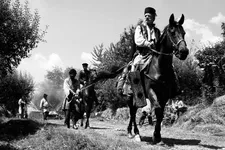 |
| Aferim! Photo: Silviu Ghetie |
It's kind of disturbing when you read dozens, and sometimes hundreds, of comments that say: "This idiot should be killed because he is destroying the image of our country." Even, because my name Jude, if you read it in Germany would mean Jew there, somebody supposed I am Jewish - which I'm not, but it would be funny if I was - and they say, "So, he's a dirty Jew making comments about our history."
Thereby proving the point you're trying to make.
Exactly.
Are you working on a new project?
Yes, I'm starting in a month to shoot a new film based on a book called Scarred Hearts by Max Blecher, a Romanian/Jewish author from the 1930s. It's less of a political film, it's going to be a film about suffering and life and love and death because the story - which is autobiographical - deals with a young man being sick and spending his time in a special sanitorium with other patients with the same condition.
So a much more confined setting than the wide open, Western-style landscapes of Aferim?
Yes, there's no movement at all because the people are in plaster casts in bed. I don't know how to make it yet!
 |
| Aferim - out December 7 |
























